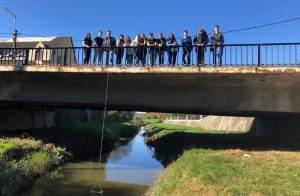Young researchers investigated the plastic pollution of Europe’s rivers
250 children and 30 teachers from 15 educational institutions participated in the program, in the framework of which micro- and macro-plastic contamination of 15 Hungarian rivers and coasts were investigated with the involvement of the Tisza PET Cup river rescue schools. The Plastic Pirates – Go Europe! campaign took place in 10 countries this autumn. Its aim is to obtain comparable results on the plastic pollution of Europe’s rivers with the help of sampling based on the same methodology.

(Photo: Plastic Pirates – Go Europe!)
The Plastic Pirates – Go Europe! a European community science (citizen science) campaign with the participation of 10 countries, in which school classes and youth groups support the work of specialists by collecting data. The children’s task is to collect micro- and macro-plastic samples from streams and rivers and accurately document the results obtained. The collected data will be analyzed by researchers in the final phase of the project. 15 Hungarian educational institutions participated in the program between September 8 and November 15. Sampling was carried out by the students from the river near the school and on the river bank in group work, under the supervision of teachers, under the guidance of the PET Cup river rescue specialists. The received data are entered into a common online database, and the results of the microplastic measurement are analyzed by Pannon University researchers and delivered to the German leading partner.
The campaign is coordinated in Hungary by the Express Innovation Agency (XIA). The project received funding from the European Union’s “Horizon Europe” research and innovation program.
The Plastic Pirates campaign thus simultaneously strengthens European scientific cooperation and helps involve society, while drawing attention to the need for an informed and careful treatment of the environment.
More than 250 children and 30 teachers took part in the occasionally one and a half hour sampling in Hungary
The youngest were fifth-graders in elementary school, and the oldest were graduating high school students, but on one occasion, students of the Budapest University of Technology and Economics also conducted sampling. 17 educational institutions applied for the call published by the Tisza PET Cup. In the selection process, it was important to reach as many rivers as possible and thus collect data from as many places as possible. In 2023, they also want to visit the applicants who have dropped out and carry out the sampling.
Finally, sampling took place at the following locations in chronological order:
1. Sárospatak – Bodrog
2. Bodrogkisfalud – Bodrog
3. Szolnok – Zagyva
4. Csongrád – Tisza
5. Hernádnémeti – Hernád
6. Kaposvár – Kapos
7. Budapest – Soroksári Danube
8. Budapest – Danube (at boat A38)
9. Budapest – Danube (before BME)
10. Nagyréde – Rédei-Nagy stream
11. Bodrog Kresztúr – Bodrog
12. Budapest – Danube (at Csepel)
13. Tiszadada – Tisza
14. Kochsord – Kraszna
15. Barcs – Drava
The organizers thank the educational institutions for their active participation in the program!
Those interested can find text, photo and video reports on the sampling and other interesting facts on the Hungarian social media channel of the campaign, and soon all the details showing the international results will be available on the European website of the campaign. The autumn Plastic Pirates – Go Europe! campaign has ended, however, the organizers are confident that there will be an opportunity to continue the project next year, as there are still plenty of rivers and coasts to explore, and there is no shortage of enthusiastic young PET pirates!
Related news
European Court of Auditors: EU Commission proposals affecting the common agricultural policy may cause uncertainty
🎧 Hallgasd a cikket: Lejátszás Szünet Folytatás Leállítás Nyelv: Auto…
Read more >European Commission to strengthen checks on agricultural products entering the EU
🎧 Hallgasd a cikket: Lejátszás Szünet Folytatás Leállítás Nyelv: Auto…
Read more >Related news
GDP growth in OECD member countries slowed to 0.3 percent in the last quarter of last year
🎧 Hallgasd a cikket: Lejátszás Szünet Folytatás Leállítás Nyelv: Auto…
Read more >








